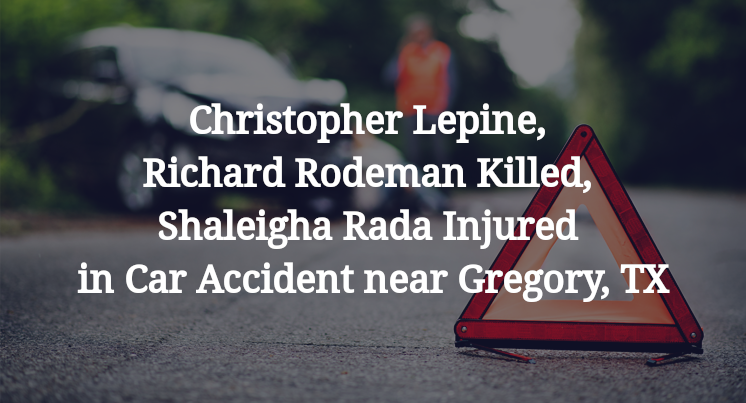Christopher Lepine, Richard Rodeman Killed, Shaleigha Rada Injured in Car Accident near Gregory, TX
San Patricio County, TX — January 26, 2025, Christopher Lepine and Richard Rodeman were killed and Shaleigha Rada was injured in a car accident at about 7 p.m. on F.M. 136.
Authorities said a 2025 Nissan Altima was traveling south on F.M. 136 when it crossed into the northbound lane for an unknown reason. It collided with a 2020 Chevrolet Equinox that was unable to avoid the crash. The impact spun both vehicles, with the Nissan coming to rest on the shoulder and the Equinox in the northbound lane.

Nissan driver Richard Rodeman, 45, and Chevrolet driver Christopher Lepine, 36, were pronounced dead at the scene of the crash near State Highway 188, according to authorities. Shaleigha Rada, 23, a passenger in the Nissan, was hospitalized with serious injuries.
Authorities have not released any additional information about the crash at this time. The accident is still under investigation.
Commentary by Attorney Michael Grossman
When I read about a crash like this one in San Patricio County, I can’t help but think about the importance of finding answers for everyone affected. While the details released so far are limited, the description of the crash raises several questions that need to be addressed to fully understand what happened and why. In any accident investigation, three critical questions must be asked: Did the authorities thoroughly investigate the crash? Has anyone looked into the possibility of a vehicle defect? And has all the available electronic data related to the crash been collected?
The first step is to examine the thoroughness of the authorities’ investigation. Based on the information provided, one vehicle apparently crossed into the oncoming lane for reasons that remain unknown. That’s a significant unanswered question. A complete investigation should explore whether the driver was impaired, distracted or experiencing a medical event. At the same time, accident reconstruction experts must consider whether environmental factors, like poor visibility or road conditions, contributed to the crash. A full understanding of how and why the vehicle veered into the wrong lane depends on whether these possibilities are rigorously investigated.
The second question is whether a vehicle defect may have played a role. It’s easy to assume the crash was caused by driver behavior, but that assumption shouldn’t rule out other possibilities. Could the Nissan have suffered a mechanical failure, such as a steering or brake malfunction, that caused the driver to lose control? Similarly, what role might the Chevrolet's safety features have played in mitigating — or failing to mitigate — the severity of the crash? Identifying these issues requires a detailed forensic examination of both vehicles, but these examinations are often overlooked unless someone ensures they happen. Preserving the vehicles in their post-crash condition is critical to making this determination.
Finally, we need to ask if all electronic data from the vehicles has been collected. Both vehicles are equipped with engine control modules (ECMs) that can provide crucial data about each vehicle’s performance in the moments leading up to the crash. These modules may reveal whether the Nissan’s driver applied the brakes or attempted to steer out of the way, or whether a mechanical failure rendered the vehicle unresponsive. Additionally, the Chevrolet’s ECM might show how quickly the vehicle responded to the sudden hazard. Beyond that, nearby surveillance cameras or cell phone data could provide more context about what occurred. Preserving and analyzing this information as quickly as possible is essential, as it can be lost or overwritten.
In the aftermath of a crash like this, the answers to these three questions are essential not only for understanding what happened but also for providing closure to those left behind. The affected families deserve to know the truth. Investigating crashes thoroughly and preserving every piece of evidence is the only way to provide those answers and honor the lives impacted.

*We appreciate your feedback and welcome anyone to comment on our blog entries, however all visitor blog comments must be approved by the site moderator prior to showing live on the site. By submitting a blog comment you acknowledge that your post may appear live on the site for any visitors to see, pending moderator approval. The operators of this site are not responsible for the accuracy or content of the comments made by site visitors. By submitting a comment, blog post, or email to this site you acknowledge that you may receive a response with regard to your questions or concerns. If you contact Grossman Law Offices using this online form, your message will not create an attorney-client relationship and will not necessarily be treated as privileged or confidential! You should not send sensitive or confidential information via the Internet. Since the Internet is not necessarily a secure environment, it is not possible to ensure that your message sent via the Internet might be kept secure and confidential. When you fill out a contact or comment form, send us an email directly, initiate a chat session or call us, you acknowledge we may use your contact information to communicate with you in the future for marketing purposes, but such marketing will always be done in an ethical way.